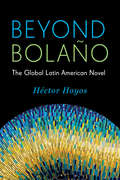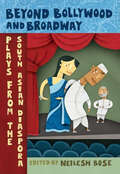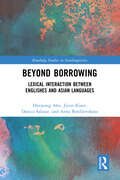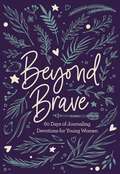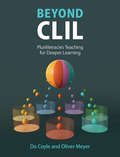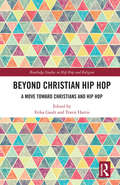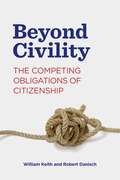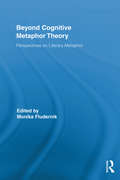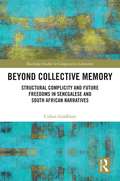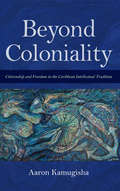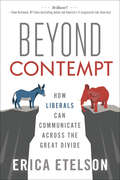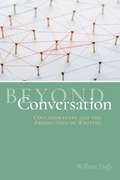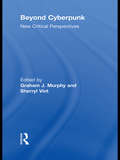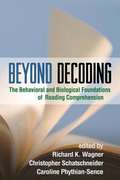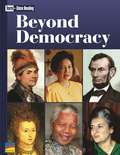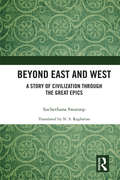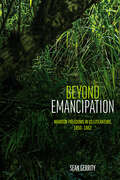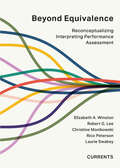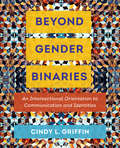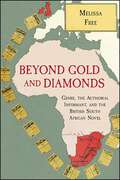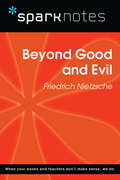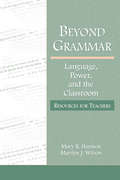- Table View
- List View
Beyond Bolaño: The Global Latin American Novel
by Héctor HoyosThrough a comparative analysis of the novels of Roberto Bolaño and the fictional work of César Aira, Mario Bellatin, Diamela Eltit, Chico Buarque, Alberto Fuguet, and Fernando Vallejo, among other contemporaries, Héctor Hoyos defines new trends in how we read and write in a globalized era.
Beyond Bolaño: The Global Latin American Novel (Literature Now)
by Héctor HoyosThrough a comparative analysis of the novels of Roberto Bolaño and the fictional work of César Aira, Mario Bellatin, Diamela Eltit, Chico Buarque, Alberto Fuguet, and Fernando Vallejo, among other leading authors, Héctor Hoyos defines and explores new trends in how we read and write in a globalized era. Calling attention to fresh innovations in form, voice, perspective, and representation, he also affirms the lead role of Latin American authors in reshaping world literature. Focusing on post-1989 Latin American novels and their representation of globalization, Hoyos considers the narrative techniques and aesthetic choices Latin American authors make to assimilate the conflicting forces at work in our increasingly interconnected world. Challenging the assumption that globalization leads to cultural homogenization, he identifies the rich textual strategies that estrange and re-mediate power relations both within literary canons and across global cultural hegemonies. Hoyos shines a light on the unique, avant-garde phenomena that animate these works, such as modeling literary circuits after the dynamics of the art world, imagining counterfactual "Nazi" histories, exposing the limits of escapist narratives, and formulating textual forms that resist worldwide literary consumerism. These experiments help reconfigure received ideas about global culture and advance new, creative articulations of world consciousness.
Beyond Bollywood and Broadway: Plays from the South Asian Diaspora
by Neilesh BoseThis collection of 11 plays, from North America, the U.K., and South Africa—many published here for the first time—delves into the vibrant, cosmopolitan theatre of the South Asian diaspora. These original and provocative works explore the experience of diaspora by drawing on cultural references as diverse as classical Indian texts, adaptations of Shakespeare and Homer, current events, and world music, film, and dance. Neilesh Bose provides historical background on South Asian migration and performance traditions in each region, along with critical introductions and biographical background on each playwright.Includes works by Anuvab Pal, Aasif Mandvi, Shishir Kurup, Rahul Varma, Rana Bose, Rukhsana Ahmad, Jatinder Verma, Sudha Bhuchar and Kristine Landon-Smith, Ronnie Govender, Kessie Govender, and Kriben Pillay.
Beyond Borrowing: Lexical Interaction between Englishes and Asian Languages (Routledge Studies in Sociolinguistics)
by Jieun Kiaer Anna Bordilovskaya Hyejeong Ahn Danica SalazarIn their book, the authors describe the usage of and attitudes towards English in Asia since the 19th century, as well as the creative and dynamic ways in which Asians of the 21st century continually reinvent the lexicon of English, and the lexicons of their native tongues. The current biggest source of loanwords for many of the world’s languages is English, the once obscure Germanic language that has risen to the role of a global lingua franca. However, the overwhelming influence of English is far from being entirely one-sided, at least from a lexical perspective. Many have decried the way that English has "invaded" the vocabularies of their languages, without realizing that the English word stock is to some extent also being invaded by these languages. This book explores the phenomenon of word exchange by examining its occurrence between English and some of the major languages spoken in Asia-highly multi-ethnic, multicultural, and multilingual region where English is the predominant medium of international and intraregional communication. Students and researchers from various linguistic areas such as World Englishes, applied linguistics, sociolinguistics, lexicology, and contact linguistics will find this book appealing.
Beyond Brave: 60 Days of Journaling Devotions for Young Women
by ZondervanBeyond Brave, a beautifully designed 60-day journaling devotional, will encourage each young woman to discover the unique way God has made you courageous. Every day will include a Bible verse, an easy-to-read and compelling devotion, and a simple step that will help strengthen and grow your brave.This devotional will lead you on an empowering journey through topics such as our identity as daughters of God, overcoming fears, facing doubt, matching anxiety with resilient faith, body image, peer pressure, building strong relationships, and helping others. With each day, you will be inspired by biblical and modern stories of heroic women of faith, such as the wisdom of Huldah the prophet, the courage of Harriet Tubman, the passion of Priscilla, the strength of Rosa Parks, the kindness of Dorcas, the compassion of Amy Carmichael, the bold generosity of Mother Teresa, and many others.This emboldening journey will remind you of your God-given call to stand strong in who God made you to be, to speak up for those who don&’t have a voice, and ultimately, to discover confident strength found in the fierce love of God.Beyond Brave:includes 60 days of devotionsfeatures 60 journaling prompts and ample writing spaceincludes Inspiring stories of Biblical women
Beyond CLIL: Pluriliteracies Teaching for Deeper Learning
by Do Coyle Oliver MeyerIf education is to prepare learners for lifelong learning, there needs to be a shift towards deeper learning: a focus on transferable knowledge and problem-solving skills alongside the development of a positive or growth mindset. In this book, a follow up to CLIL, the authors review new developments in the understanding of the interface between language and learning, and propose an original new 'pluriliteracies' approach which refines and develops current thinking in CLIL. It aims to facilitate deeper learning through an explicit focus on disciplinary literacies, guiding learners towards textual fluency, encouraging successful communication across cultures, and providing a key stepping-stone towards becoming responsible global citizens. It both provides strong theoretical grounding, and shows how to put that understanding into practise. Engaging and practical, this book will be invaluable to both academics and education practitioners, and will enable conventional classrooms to be transformed into deeper learning ecologies.
Beyond Christian Hip Hop: A Move Towards Christians and Hip Hop (Routledge Studies in Hip Hop and Religion)
by Erika D. Gault Travis HarrisChristians and Christianity have been central to Hip Hop since its inception. This book explores the intersection of Christians and Hip Hop and the multiple outcomes of this intersection. It lays out the ways in which Christians and Hip Hop overlap and diverge. The intersection of Christians and Hip Hop brings together African diasporic cultures, lives, memories and worldviews. Moving beyond the focus on rappers and so-called "Christian Hip Hop," each chapter explores three major themes of the book: identifying Hip Hop, irreconcilable Christianity, and boundaries.There is a self-identified Christian Hip Hop (CHH) community that has received some scholarly attention. At the same time, scholars have analyzed Christianity and Hip Hop without focusing on the self-identified community. This book brings these various conversations together and show, through these three themes, the complexities of the intersection of Christians and Hip Hop. Hip Hop is more than rap music, it is an African diasporic phenomenon. These three themes elucidate the many characteristics of the intersection between Christians and Hip Hop and our reasoning for going beyond "Christian Hip Hop." This collection is a multi-faceted view of how religious belief plays a role in Hip Hoppas' lives and community. It will, therefore, be of great interest to scholars of Religion and Hip Hop, Hip Hop, African Diasporas, Religion and the Arts, Religion and Race and Black Theology as well as Religious Studies more generally.
Beyond Civility: The Competing Obligations of Citizenship (Rhetoric and Democratic Deliberation #23)
by William Keith Robert DanischFrom the pundits to the polls, nearly everyone seems to agree that US politics have rarely been more fractious, and calls for a return to "civil discourse" abound. Yet it is also true that the requirements of polite discourse effectively silence those who are not in power, gaming the system against the disenfranchised. What, then, should a democracy do?This book makes a case for understanding civility in a different light. Examining the history of the concept and its basis in communication and political theory, William Keith and Robert Danisch present a clear, robust analysis of civil discourse. Distinguishing it from politeness, they claim that civil argument must be redirected from the goal of political comity to that of building and maintaining relationships of minimal respect in the public sphere. They also take into account how civility enables discrimination, indicating conditions under which uncivil resistance is called for. When viewed as a communication practice for uniting people with differences and making them more equal, civility is transformed from a preferable way of speaking into an essential component of democratic life. Guarding against uncritical endorsement of civility as well as skepticism, Keith and Danisch show with rigor, nuance, and care that the practice of civil communication is both paradoxical and sorely needed. Beyond Civility is necessary reading for our times.
Beyond Civility: The Competing Obligations of Citizenship (Rhetoric and Democratic Deliberation)
by William Keith Robert DanischFrom the pundits to the polls, nearly everyone seems to agree that US politics have rarely been more fractious, and calls for a return to “civil discourse” abound. Yet it is also true that the requirements of polite discourse effectively silence those who are not in power, gaming the system against the disenfranchised. What, then, should a democracy do?This book makes a case for understanding civility in a different light. Examining the history of the concept and its basis in communication and political theory, William Keith and Robert Danisch present a clear, robust analysis of civil discourse. Distinguishing it from politeness, they claim that civil argument must be redirected from the goal of political comity to that of building and maintaining relationships of minimal respect in the public sphere. They also take into account how civility enables discrimination, indicating conditions under which uncivil resistance is called for. When viewed as a communication practice for uniting people with differences and making them more equal, civility is transformed from a preferable way of speaking into an essential component of democratic life. Guarding against uncritical endorsement of civility as well as skepticism, Keith and Danisch show with rigor, nuance, and care that the practice of civil communication is both paradoxical and sorely needed. Beyond Civility is necessary reading for our times.
Beyond Cognitive Metaphor Theory: Perspectives on Literary Metaphor (Routledge Studies in Rhetoric and Stylistics)
by Monika FludernikIn this innovative collection, an international group of scholars come together to discuss literary metaphors and cognitive metaphor theory. The volume's goals are three-fold. The first aim of the book is to present some recent approaches to metaphor which have no immediate connection with cognitive metaphor theory and have developed independently of it. While the cognitive approach has become the leading paradigm in the English speaking world, elsewhere (in Europe) rhetorical, semantic, and logical models have remained in use and continue to be elaborated. These models have so far had little international exposure. Their inclusion in this study is meant to provide a balance to the cognitive paradigm and to open up a possible discussion of the advantages and disadvantages of cognitive metaphor theory for the analysis of literary texts. The second aim of the collection is to illustrate a range of successful applications of the new cognitive models to literary texts. And, the third aim of the study is to provide an assessment of cognitive metaphor theory from a literary point of view.
Beyond Collective Memory: Structural Complicity and Future Freedoms in Senegalese and South African Narratives (Routledge Studies in Comparative Literature)
by Cullen GoldblattBeyond Collective Memory analyzes how two African places became icons of collective memory for certain publics, yet remain marginal to national and continental memory discourses. Thiaroye, a Senegalese location of colonial-era massacre, and District Six, a South African neighborhood destroyed under apartheid, have epitomized a shared "memory" of racist violence and resistant community. Analyzing diverse cultural texts surrounding both places, this book argues that the metaphor of collective memory has obscured the structural character of colonial and apartheid violence, and made it difficult to explore the complicit positions that structures of violence produce. In investigating the elisions of memory discourses, Beyond Collective Memory challenges the dominance of collective memory, and calls attention to the African pasts, metaphors, and imaginaries that exist beyond it.
Beyond Coloniality: Citizenship and Freedom in the Caribbean Intellectual Tradition (Blacks in the Diaspora)
by Aaron KamugishaAgainst the lethargy and despair of the contemporary Anglophone Caribbean experience, Aaron Kamugisha gives a powerful argument for advancing Caribbean radical thought as an answer to the conundrums of the present. Beyond Coloniality is an extended meditation on Caribbean thought and freedom at the beginning of the 21st century and a profound rejection of the postindependence social and political organization of the Anglophone Caribbean and its contentment with neocolonial arrangements of power. Kamugisha provides a dazzling reading of two towering figures of the Caribbean intellectual tradition, C. L. R. James and Sylvia Wynter, and their quest for human freedom beyond coloniality. Ultimately, he urges the Caribbean to recall and reconsider the radicalism of its most distinguished 20th-century thinkers in order to imagine a future beyond neocolonialism.
Beyond Contempt: How Liberals Can Communicate Across the Great Divide
by Erica EtelsonA guide to productive dialogue across ideological divides with practical tools for building trust, defusing hostility, and approaching hot-button topics.With the election of President Biden, many liberals thought that the world of political discourse would somehow go back to normal. But the continued extremism of Republican politicians and conservative pundits has only stoked the flames of progressive disdain in ways that make it harder than ever to engage in civil debate.In Beyond Contempt, Erica Etelson shows us how to communicate effectively across the political divide without soft-pedaling our beliefs—or playing into the hands of divisive politicians. Using Powerful Non-Defensive Communication skill sets, we can express ourselves in ways that inspire open-minded consideration instead of triggering defensive reactions. With detailed instruction and helpful examples, Etelson demonstrates how we can open hearts and minds in unexpected ways.
Beyond Conversation: Collaboration and the Production of Writing
by William DuffyCollaboration was an important area of study in writing for many years, but interest faded as scholars began to assume that those working within writing studies already “got it.” In Beyond Conversation, William Duffy revives the topic and connects it to the growing interest in collaboration within digital and materialist rhetoric to demonstrate that not only do the theory, pedagogy, and practice of collaboration need more study but there is also much to be learned from the doing of collaboration. While interrogating the institutional politics that circulate around debates about collaboration, this book offers a concise history of collaborative writing theory while proposing a new set of commonplaces for understanding the labor of coauthorship. Specifically, Beyond Conversation outlines an interactionist theory that explains collaboration as the rhetorical capacity that manifests in the discursive engagements coauthors enter into with the objects of their writing. Drawing on new materialist philosophies, post-qualitative inquiry, and interactionist rhetorical theory, Beyond Conversation challenges writing and literacy educators to recognize the pedagogical benefits of collaborative writing in the work they do both as writers and as teachers of writing. The book will reinvigorate how teachers, scholars, and administrators advocate for the importance of collaborative writing in their work.
Beyond Cyberpunk: New Critical Perspectives (Routledge Studies In Contemporary Literature Ser. #3)
by Graham J. MurphyThis book is a collection of essays that considers the continuing cultural relevance of the cyberpunk genre into the new millennium. Cyberpunk is no longer an emergent phenomenon, but in our digital age of CGI-driven entertainment, the information economy, and globalized capital, we have never more been in need of a fiction capable of engaging with a world shaped by information technology. The essays in explore our cyberpunk realities to soberly reconsider Eighties-era cyberpunk while also mapping contemporary cyberpunk. The contributors seek to move beyond the narrow strictures of cyberpunk as defined in the Eighties and contribute to an ongoing discussion of how to negotiate exchanges among information technologies, global capitalism, and human social existence. The essays offer a variety of perspectives on cyberpunk’s diversity and how this sub-genre remains relevant amidst its transformation from a print fiction genre into a more generalized set of cultural practices, tackling the question of what it is that cyberpunk narratives continue to offer us in those intersections of literary, cultural, theoretical, academic, and technocultural environments.
Beyond Decoding
by Richard Wagner Christopher SchatschneiderWhat cognitive processes and skills do children draw on to make meaning from text? How are these capacities consolidated over the course of development? What puts some learners at risk for comprehension difficulties? This authoritative volume presents state-of-the-science research on the behavioral and biological components of successful reading comprehension. Uniquely integrative, the book covers everything from decoding, fluency, and vocabulary knowledge to embodiment theory, eye movements, gene environment interactions, and neurobiology. The contributors are prominent investigators who describe their methods and findings in depth and identify important implications for the classroom.
Beyond Democracy (Texts For Close Reading Ser.)
by Benchmark Education Co. LLC StaffNIMAC-sourced textbook
Beyond East and West: A Story of Civilization through the Great Epics
by Suchethana SwaroopThis volume is a cross-cultural study of the evolution of civilisation. Drawing its material and inspiration from literature and culture, it looks at the achievements of humankind as a single imaginative experience. The book examines how traditions of poetry and literature have shaped cultures, societies and civilisations, and their inter-relatedness. Analysing stereotypes in Asia and Europe, the author raises questions fundamental to our perceptions of culture, democracy, and language. He throws light on dominant languages and languages cast aside by the tides of history, and attributes the status of English as a 'world language' to ideas propagated in the great epics of the West — particularly Roman — and the poetic heritage shaped by them. Discussing the fallout of that dream on other cultures and ‘non-technical’ languages of the world, this book investigates questions of legitimacy and desirability of a single language or culture becoming universal. A sensitive and nuanced work, it promises a good read for general readers as well as researchers interested in world literature, comparative literature, sociology and cultural studies, in the interaction between science and art, and in the forces that shape the world order.
Beyond Emancipation: Maroon Freedoms in US Literature, 1850–1862 (SUNY series in Multiethnic Literatures)
by Sean GerrityExplores how African American literary representations of maroons in the decade leading up to the Civil War complicate conventional narratives and geographies of slavery and freedom in the United States.Beyond Emancipation revisits classic works of nineteenth-century American literature, especially by Black writers, to uncover a hidden history of maroons-enslaved people who ran away but remained hidden in the South. Sean Gerrity argues that literary depictions of "small acts" of marronage reveal an expanded sense of what freedom might look like and where and when it might occur. While taking care not to romanticize historical realities, Gerrity vividly shows how works by Frederick Douglass, Harriet Jacobs, and Martin Delany gesture toward possibilities for Black freedom-making beyond legal emancipation, liberalism, and the white abolitionist literary tradition passed down from Harriet Beecher Stowe. While Beyond Emancipation focuses on texts produced during the brief period between the Fugitive Slave Act of 1850 and the Civil War, the book's range of reference and implications are broad, unsettling still dominant ideas and engaging pressing questions in literary criticism, history, geography, and Black studies.
Beyond Equivalence: Reconceptualizing Interpreting Performance Assessment
by Robert G. Lee Christine Monikowski Elizabeth A. Winston Laurie Swabey Rico PetersonThere is a longstanding need for valid, reliable measurements of interpreting competence. Although rubrics and checklists are commonly used in both academic and employment settings, a review of available rubrics indicates that many do not focus on interpreting performance. Traditional metrics for sign language interpreting often conflate language proficiency with interpreting proficiency. Conflating fundamental aspects of language in use—vocabulary, grammar, and prosody— with fundamental aspects of interpretation—content, intent, and monitoring—compromises the valid assessment of interpreting proficiency. Beyond Equivalence: Reconceptualizing Interpreting Performance Assessment argues for a shift toward more nuanced and evidence-based conceptualizations of interpreting, communication, and meaning to improve the creation and use of rubrics for assessment in interpreter education, certification, and professional development. This inaugural volume in the Currents series introduces a rubric and accompanying scale, which can be used to assess both simultaneous and consecutive interpreting performance in terms of both process and product, in both signed and spoken language interpreting, and in a variety of settings. Beyond Equivalence offers an appreciation of the multivarious nature of meaning in the interpreting process and presents a new paradigm for the measurement of interpreting proficiency.
Beyond Fitting In: Rethinking First-Generation Writing and Literacy Education
by Kelly RitterBeyond Fitting In interrogates how the cultural capital and lived experiences of first-generation college students inform literacy studies and the writing-centered classroom. Essays, written by scholar-teachers in the field of rhetoric and composition, discuss best practices for teaching first-generation students in writing classrooms, centers, programs, and other environments. The collection considers how first-gen students of different demographics interact with and affect literacy instruction in a variety of public and private, rural and urban schools offering two- or four-year programs, including Hispanic-serving institutions, historically Black colleges and universities, and public research universities. By exploring the experiences of students, teachers, writing program administrators, and writing center directors, the volume gives readers an inside view of the practices and structures that shape the literacy of first-generation students.
Beyond Gender Binaries: An Intersectional Orientation to Communication and Identities
by Cindy L. GriffinBeyond Gender Binaries uses a feminist, intersectional, and invitational approach to understanding identities and how they relate to communication. Taking readers outside the familiar binary constructions of gender and identity, Cindy L. Griffin addresses—through a feminist intersectional lens—communication, identity, power and privilege, personhood and citizenship, safety in public and private spaces, and hegemony and colonialism. Twelve chapters focus on critical learning through careful exploration of key terms and concepts. Griffin illustrates these with historical and contemporary examples and provides concrete guides to intersectional approaches to communication. This textbook highlights not just the ways individuals, systems, structures, and institutions use communication to privilege particular identities discursively and materially, but also the myriad ways that communication can be used to disrupt privilege and respectfully acknowledge the nonbinary and intersectional nature of every person’s identity. Key features include: Intersectional approaches to explaining and understanding identities and communication are the foundation of each chapter and inform the presentation of information throughout the book.Contemporary and historical examples are included in every chapter, highlighting the intersectional nature of identity and the role of communication in our interactions with other people.Complex and challenging ideas are presented in clear, respectful, and accessible ways throughout the book.
Beyond Gold and Diamonds: Genre, the Authorial Informant, and the British South African Novel (SUNY series, Studies in the Long Nineteenth Century)
by Melissa FreeBeyond Gold and Diamonds demonstrates the importance of southern Africa to British literature from the 1880s to the 1920s, from the rise of the systematic exploitation of the region's mineral wealth to the aftermath of World War I. It focuses on fiction by the colonial-born Olive Schreiner, southern Africa's first literary celebrity, as well as by H. Rider Haggard, Gertrude Page, and John Buchan, its most influential authorial informants, British authors who spent significant time in the region and wrote about it as insiders. Tracing the ways in which generic innovation enabled these writers to negotiate cultural and political concerns through a uniquely British South African lens, Melissa Free argues that British South African literature constitutes a distinct field, one that overlaps with but also exists apart from both a national South African literary tradition and a tradition of South African literature in English. The various genres that British South African novelists introduced—the New Woman novel, the female colonial romance, the Rhodesian settler romance, and the modern spy thriller—anticipated metropolitan literary developments while consolidating Britain's sense of its own dominion in a time of increasing opposition.
Beyond Good and Evil (SparkNotes Philosophy Guide)
by SparkNotesBeyond Good and Evil (SparkNotes Philosophy Guide) Making the reading experience fun! SparkNotes Philosophy Guides are one-stop guides to the great works of philosophy–masterpieces that stand at the foundations of Western thought. Inside each Philosophy Guide you&’ll find insightful overviews of great philosophical works of the Western world.
Beyond Grammar: Resources for Teachers (Language, Culture, and Teaching Series)
by Mary R. Harmon Marilyn J. WilsonBeyond Grammar: Language, Power, and the Classroom asks readers to think about the power of words, the power of language attitudes, and the power of language policies as they play out in communities, in educational institutions, and in their own lives as individuals, teachers, and participants in the larger community. Each chapter provides extended discussion of a set of critical language issues that directly affect students in classrooms: the political nature of language, the power of words, hate language and bullying, gender and language, dialects, and language policies. Written for pre-service and practicing teachers, this text addresses how teachers can alert students to the realities of language and power--removing language study from a “neutral” corner to situate it within the context of political, social, and cultural issues. Developing a critical pedagogy about language instruction can help educators understand that classrooms can either maintain existing inequity or address and diminish inequity through critical language study. A common framework structures the chapters of the text: * Each chapter begins with an overview of the language issue in question, and includes references for further research and for classroom use, and provides applications for classroom teachers.* Numerous references to the popular press and the breadth of language issues found therein foreground current thought on socio-cultural language issues, attitudes, standards, and policies found in the culture(s) at large.* References to current and recent events illustrate the language issue’s importance, cartoons address the issue, and brief “For Thought” activities illustrate the point being discussed and extend the reader’s knowledge and awareness.* “Personal Explorations” ask readers to go beyond the text to develop further understanding; “Teaching Explorations” ask teachers to apply chapter content to teaching situations. Beyond Grammar: Language, Power, and the Classroom is intended for undergraduate and master’s level courses that address literacy education, linguistics, and issues of language and culture.
